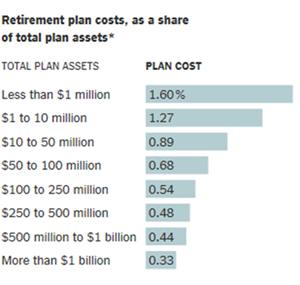|

Your Money
Simpler, Less Expensive 401(k) Options Emerge for Small Businesses
SEPT.
11, 2015
|

Jon Stein at Betterment's office in
Manhattan. The investment firm has 106,000 customers and $2.6
billion in assets.
Credit Danny Ghitis for The New York Times |
The
way Jon Stein sees it, receiving financial advice for
retirement should be a
fundamental right.
Betterment, the investment firm
Mr. Stein created just five years ago, is now one of the
higher-profile
robo-advisers — companies that
automatically build and manage customized portfolios of low-cost
investments for people who can’t afford the type of
financial adviser who sits behind
a mahogany desk.
He
argues that all workers who save using a
401(k) should be entitled to
personalized help and investment management services: When an employer
offers a retirement plan without any recommendations, Mr. Stein
reasons, it’s akin to providing a
health insurance plan that lists
medications without any doctors.
Given
that philosophy, perhaps it was only a matter of time before his firm
— with 106,000 customers and $2.6 billion in assets — would plunge
into the 401(k) business. Starting in the first quarter of next year,
the firm will begin offering the plans to employers, with a focus on
smaller businesses (though it’s essentially equipped to handle larger
ones, too).
Economies of Scale
The costs of running an employer-sponsored 401(k) plan are often
higher, relative to total plan assets, for small companies than
for larger ones. Big plans tend to have a greater portion of
their money invested in index funds, which often have lower
expenses than other investments. Moreover, there are some fixed
costs in running a plan — and as plans grow in size, those costs
can be spread across more employees and a larger asset base.
|
|
 |
|
|
*Among plans with audited
401(k) filings in the BrightScope database (2012)
Source: BrightScope and
Investment Company Institute
By The New York Times
|
|
Small
businesses, which
employ nearly half of all private
sector workers, could surely use the help.
Only
14 percent of employers with fewer than 100 employees offer a 401(k)
plan, according to a
report from the Government
Accountability Office. Even when these workers have access to a
401(k), they often pay three times as much as workers at larger
companies, if not more. And if the business owner bought the 401(k)
plan from a broker, the investment lineup might be rife with conflicts
of interest and high-cost, actively managed
mutual funds. As for financial
advice, it’s not always an option.
But
the landscape is rapidly evolving. In addition to Betterment, several
other
technology-driven providers have
started offering 401(k) plans in recent years, with a focus on
reducing costs and the complex administrative burdens for small
employers.
Vanguard started catering to
smaller businesses about four years ago and has already signed up more
than 4,000 employers covering 162,000 participants.
Mr.
Stein said he hoped to elevate 401(k) plans to the next level,
bringing the kind of holistic service that personal finance nerds
could only dream of. You know, things like automatic management and
rebalancing, taking into account your rollover Individual Retirement
Account, a spouse’s plans and future
Social Security benefits.
By
looking at the entire picture, it can tell you how much you need to
save and in which accounts — say a 401(k) versus a Roth or taxable
account.
“That
is like fundamental stuff that everyone should have a right to if we
are going to put the responsibility of saving for retirement on
individuals, which is what we’ve done in this country,” said
Mr. Stein from Betterment’s
offices, a loft space that was formerly a dojo, or martial arts
studio, in the Chelsea neighborhood of Manhattan.
Since
all of this advice is driven by algorithms, not humans, it helps
contain costs: 401(k) plans with less than $1 million in assets had an
average cost of 1.6 percent of the plan’s total assets in 2012. That
compares with 0.54 percent for plans with $100 million to $250
million, according to a
research report by BrightScope
and the Investment Company Institute in 2014.
The
fees for small plans also tend to vary greatly. The vast majority of
401(k)’s with less than $1 million in total assets had costs that
ranged somewhere from 0.68 percent to a scandalous 2.66 percent.
Part
of the reason is economics. Small plans have less money to manage, so
they generate less in fees and have less negotiating power. But
another driving factor is the way the industry is structured.
“It
has tended to attract the high-cost providers in part because of the
economics, but in part because in this area of the market, the plans
are sold, not bought,” said
Mike Alfred, co-founder and chief
executive of BrightScope, which tracks and rates retirement plans. “So
there is an adviser or rep going into that company and convincing the
chief executive officer, human resources or the chief financial
officer to set up a plan,” he added. “And usually the high-cost
providers are the ones that have the economics to pay the adviser to
support that effort.”
In
case you haven’t already heard, paying all those fees can seriously
affect your nest egg: Paying just 1 percentage point more annually
could reduce savings by nearly 30 percent over an individual’s working
career, according to Labor Department calculations.
Imagine an employee who saved $25,000 in a 401(k); she doesn’t make
any new contributions and earns 7 percent over the next 35 years. If
she paid 0.5 percent in total fees, the account would grow to
$227,000. But paying fees totaling 1.5 percent would leave her with
$163,000 — that’s 28 percent less.
For
the tiniest companies, Betterment will charge .60 percent of plan
assets, plus the cost of the actual investments, which tend to be
another .1 percent, on average. There is also a $1,500 setup fee for
new plans. The fees decline as the company’s assets grow.
Those
expenses are all inclusive, wrapping in the customized, automatically
managed portfolio and all of the administrative work that a 401(k)
plan demands, a task that is often handled by a third-party
administrator or record-keeping firm. (Vanguard, for instance, works
with Ascensus.)
But
Mr. Stein said Betterment built its own system from scratch, which
means the managed investment accounts can talk directly to its
record-keeping arm. That, he says, has enabled the company to simplify
many administrative tasks and regulatory compliance, making life
easier for employers sponsoring the plans.
His
team learned a lot when they were shopping around for their own
401(k), back in early 2014 when they had about 50 employees. “We found
this process to be super difficult for us, and we are pretty
sophisticated,” said Mr. Stein, who ultimately chose Vanguard. Though
Vanguard charges a flat fee per participant, he said it cost them the
equivalent of 0.82 percent of total assets.
Even
though the Department of Labor, which oversees retirement plans, now
requires plan providers to itemize their costs of services —
separating investment costs from administrative ones — comparing plan
prices can still be mind-boggling, particularly for a time-constrained
entrepreneur.
The
Labor Department is now trying to take its oversight a step further,
and has
proposed a rule that would
require more brokers to act in the best interest of their small
business customers when selling retirement plans and suggesting
investments, a rule that is now easily bypassed. (Brokers must meet a
five-part test before they are deemed a fiduciary, which means they
must put their customers interest before their own.) Depending on how
the
final rule is written, it could
force even more transparency.
The
financial services industry has argued that such a rule would make it
too costly to work with smaller investors and plans, but there are
plenty of providers, including Betterment, lining up to take their
place, at least in the 401(k) space.
Kevin
Busque, a co-founder of TaskRabbit, the online marketplace that
connects individuals with people willing to complete small jobs, is
gearing up to introduce a 401(k)
plan to small employers through his new start-up,
Guideline.
Another company,
Dream Forward Financial, goes
beyond lowering costs and providing a modernized interface. Its 401(k)
service will attempt to address the reasons people don’t save for
retirement, like buying a home or sending a child to college.
ForUsAll and
America’s Best 401(k) are two
other newer players, while
Employee Fiduciary, Capital One’s
ShareBuilder 401(k) and
Ubiquity (formerly the Online
401(k)) have each offered lower-cost plans for at least a decade.
“They
are using low-cost funds and exchange-traded funds, so it is a lot
cleaner and cheaper for everyone,” said
William Trout, a senior analyst
at Celent who tracks technology-focused financial firms.
Given
the rising number of options, there hasn’t been a better time for
workers in small businesses to make a case to their employer for a new
or improved 401(k) plan.
“This
is something of a national scandal,” Mr. Trout said. “We lionize small
business in this country. But the fact of the matter is that part of
working for a small business means paying a lot more — and in many
cases, twice as much more — for their 401(k) plans than big corporate
employees.”
Make the
most of your money. Every Monday get articles about retirement, saving
for college, investing, new online financial services and much more.
A version
of this article appears in print on September 12, 2015, on page B1 of
the New York edition with the headline: More 401(k) Options for Small
Business.
© 2015 The
New York Times Company |